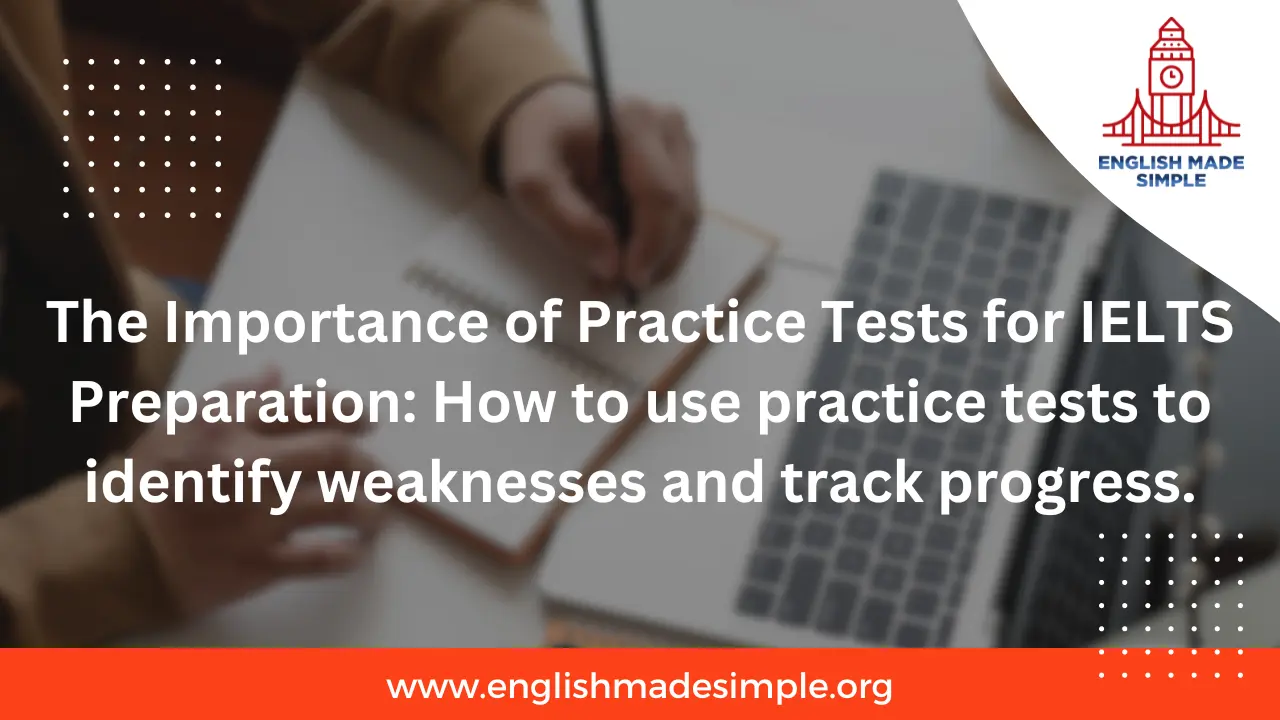
The Importance of Practice Tests for IELTS Preparation: How to Use Practice Tests to Identify Weaknesses and Track Progress
Preparing for the IELTS (International English Language Testing System) can be a daunting task. With its comprehensive evaluation of listening, reading, writing, and speaking skills, achieving a high score requires strategic preparation. Among various preparation methods, practice tests stand out as a crucial component. This blog explores the importance of practice tests in IELTS preparation and provides a guide on how to effectively use them to identify weaknesses and track progress.
Why Practice Tests Are Essential for IELTS Preparation
Familiarization with the Test Format:
- IELTS practice tests help candidates become familiar with the test format, question types, and time constraints. Understanding the structure of the test reduces anxiety and builds confidence.
Time Management Skills:
- Practicing under timed conditions helps develop time management skills. Knowing how much time to allocate to each section ensures that candidates can complete the test within the allotted time.
Realistic Simulation:
- Practice tests provide a realistic simulation of the actual exam environment. This experience helps candidates acclimate to the pressure of the test day, improving their performance.
Self-Assessment:
- By taking practice tests, candidates can assess their current level of proficiency. This self-assessment is crucial for setting realistic goals and creating an effective study plan.
How to Use Practice Tests to Identify Weaknesses
Analyze Incorrect Answers:
- After completing a practice test, thoroughly review incorrect answers. Identify patterns in mistakes—whether they are related to specific question types, sections, or common errors (e.g., grammar, vocabulary).
Focus on Weak Sections:
- Determine which sections (listening, reading, writing, speaking) you struggle with the most. Allocate more study time to these areas and use targeted practice materials to address these weaknesses.
Seek Feedback:
- For the writing and speaking sections, seek feedback from teachers, tutors, or peers. Understanding the reasons behind your mistakes is key to improving.
Track Progress Over Time:
- Keep a record of your scores and performance on practice tests. This helps you monitor improvement and adjust your study plan accordingly.
How to Use Practice Tests to Track Progress
Set Benchmarks:
- Establish baseline scores by taking an initial practice test. Use these scores as benchmarks to measure your progress.
Regular Testing:
- Schedule regular practice tests throughout your preparation period. Weekly or bi-weekly tests can provide consistent feedback on your progress.
Score Comparison:
- Compare your scores from different practice tests. Look for trends in improvement and areas that still need work.
Adjust Study Plan:
- Based on your performance, continually adjust your study plan. Focus on areas where you see little to no improvement and experiment with different study techniques if needed.
Celebrate Milestones:
- Recognize and celebrate small milestones in your progress. Achieving a higher score in a particular section or reducing the number of mistakes are signs of improvement and can boost motivation.
Tips for Effective Use of Practice Tests
Simulate Test Conditions:
- Take practice tests in a quiet environment, free from distractions. Mimicking test day conditions helps build the right mindset and reduces test-day anxiety.
Use Official Practice Materials:
- Rely on official IELTS practice tests and materials. These are designed to accurately reflect the content and difficulty of the actual exam.
Review and Reflect:
- Spend time reviewing your answers and reflecting on your performance. Understanding your mistakes is crucial for improvement.
Balanced Approach:
- While practice tests are important, balance them with other study activities such as vocabulary building, grammar exercises, and skill-specific practice.
Stay Consistent:
- Consistency is key. Regular practice and review sessions will yield better results than cramming or sporadic studying.
Conclusion
Practice tests are an indispensable tool in IELTS preparation. They not only familiarize candidates with the test format but also help in identifying weaknesses and tracking progress. By using practice tests effectively, candidates can create a focused and efficient study plan, leading to better performance on test day. Remember, the journey to achieving your desired IELTS score is a marathon, not a sprint. Regular practice, consistent review, and a strategic approach will guide you to success.
